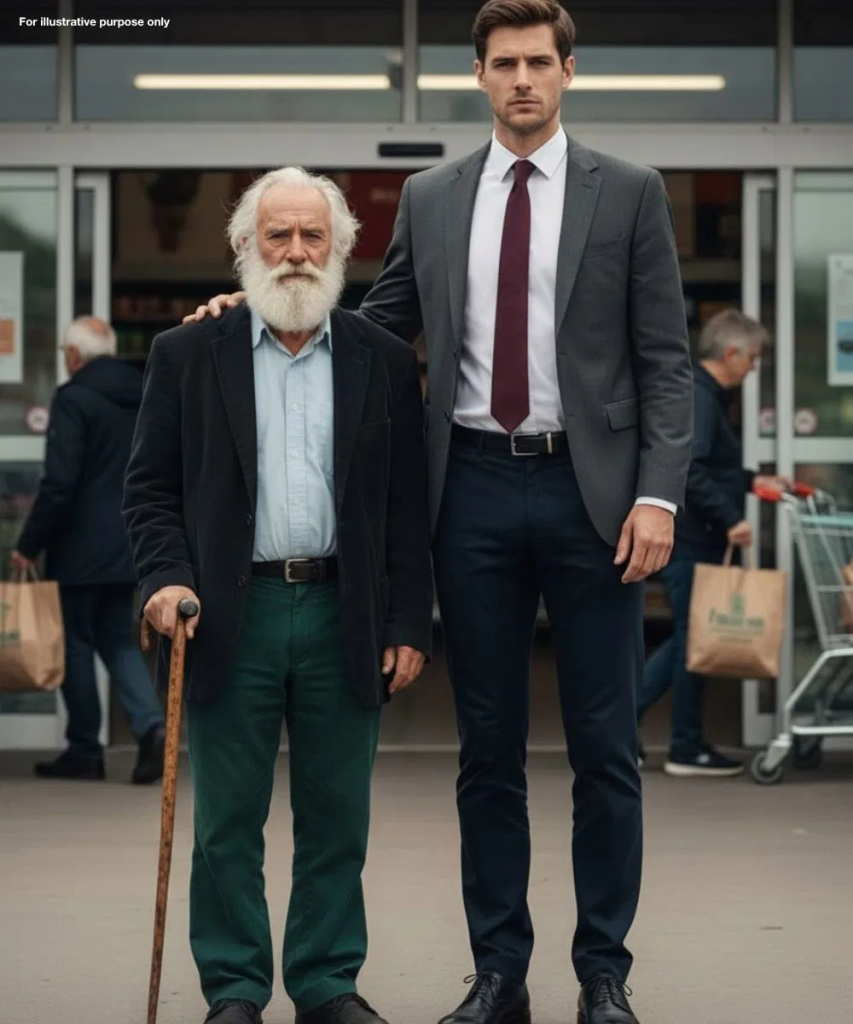At ninety, I disguised myself as a frail, hungry old man and walked into my own supermarket. What happened that day changed the course of my legacy forever.
I never imagined I’d be the type of man to bare his soul to strangers. But after living nearly a century, vanity fades. What matters is the truth—and who you leave it to.

My name is Mr. Hutchins. I built the largest supermarket chain in Texas from a single corner store after the war, back when bread cost a nickel and neighbors left their doors unlocked. By eighty, my name shone on hundreds of storefronts across five states. They called me “The Bread King of the South.”
Yet no amount of money could buy the warmth of a shared morning, the laughter over coffee, or the comfort of a hand held in hardship. My wife passed in 1992. We never had children.
And one quiet night, in my vast empty house, a question struck me: Who will inherit all this?
Not corporate sharks. Not polished lawyers. I wanted someone genuine—someone who still understood kindness, even when no one is watching.
So I made a choice no one expected. I put on tattered clothes, dusted my face, let my beard grow wild, and walked into my store looking like a man the world had forgotten.
Whispers followed me down the aisles. A young cashier wrinkled her nose. “Something smells rotten,” she muttered to a coworker. Both burst into laughter.
A father pulled his son aside. “Don’t look at him, Tommy.”
Every step felt like a trial in a kingdom I had built. Then came the manager. Kyle Ransom, once promoted by me for bravery during a store fire, now looked at me with disgust.
“We don’t want people like you here,” he spat.
People like me. The irony nearly made me laugh.
I turned to leave—but a gentle hand gripped my arm.
He was young, maybe thirty. His tie frayed, his shirt worn, but his eyes were kind. Lewis — Administrative Assistant.
“Come with me,” he said quietly. “Let’s get you something to eat.”
“I have no money,” I rasped.
“You don’t need money to be treated with respect,” he replied, smiling.
In the break room, he poured me coffee and handed me a sandwich. “You remind me of my dad,” he said softly. “He passed last year… had that same look, like life had shown him too much.”
Tears burned behind my eyes. That sandwich tasted like gold. I wanted to reveal who I was—but not yet.
That night, I rewrote my will. Every store, every dollar, every acre—left to Lewis.
A week later, I returned to the same supermarket—this time in a charcoal-gray suit, polished shoes, cane in hand. The doors opened, and the same people bowed.
“Mr. Hutchins! Welcome, sir!”
“Can we get you a cart?”
Kyle stumbled back, pale. “M–Mr. Hutchins! I had no idea—”
“No,” I said. “You didn’t.”
Across the room, Lewis met my gaze. No smile. Just understanding.
That evening, he called. “I knew it was you,” he said. “But kindness shouldn’t depend on who someone is. You looked hungry. That was enough.”
He had passed the test.
The next morning, I arrived with my lawyers. Kyle and the cashier were dismissed. I announced to the staff:
“This man,” I said, pointing to Lewis, “is your new boss—and the future owner of this chain.”
Then came an anonymous letter: Don’t trust Lewis. Check Huntsville Prison, 2012.
At nineteen, he’d stolen a car. Served eighteen months. He didn’t deny it.
“I was young and foolish,” he said. “Prison taught me what it means to lose dignity—and why no one should be denied it.”
I believed him. His eyes held the truth carved by pain.
My relatives disagreed. Furious, they appeared out of nowhere, shouting that I’d lost my mind. I told them, “Blood doesn’t make family. Compassion does.”
When I told Lewis the whole story—the disguise, the will, the threats—he simply said:
“I don’t want your money, sir. Use it to help others. Start something that lasts.”
And so I did.
Everything went to the Hutchins Foundation for Human Dignity—to feed the hungry, educate the young, and give second chances to the forgotten.
When I handed Lewis the papers naming him director for life, he whispered,
“My father used to say, ‘Character is what you show when no one’s watching.’ You’ve lived by that.”
Now, at ninety, I wait peacefully for my final day—knowing my true heir isn’t bound by blood or greed, but by kindness freely given to a stranger.
If you ever doubt that goodness still exists, remember Lewis’s words:
“You don’t need money to be treated with respect.”